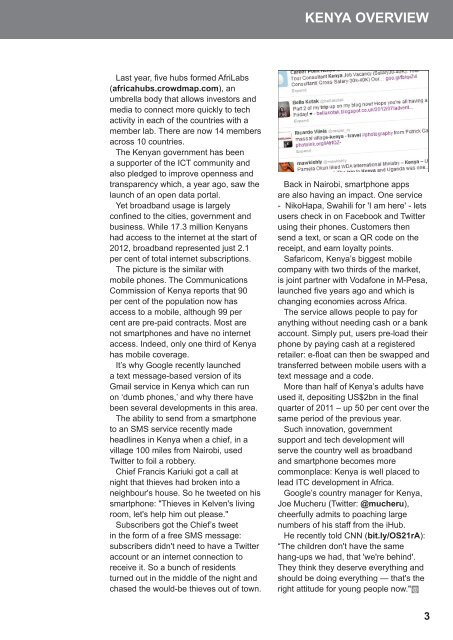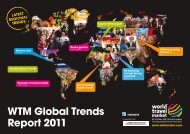Kenya gets connected - World Travel Market
Kenya gets connected - World Travel Market
Kenya gets connected - World Travel Market
You also want an ePaper? Increase the reach of your titles
YUMPU automatically turns print PDFs into web optimized ePapers that Google loves.
KENYA OVERVIEWLast year, five hubs formed AfriLabs(africahubs.crowdmap.com), anumbrella body that allows investors andmedia to connect more quickly to techactivity in each of the countries with amember lab. There are now 14 membersacross 10 countries.The <strong>Kenya</strong>n government has beena supporter of the ICT community andalso pledged to improve openness andtransparency which, a year ago, saw thelaunch of an open data portal.Yet broadband usage is largelyconfined to the cities, government andbusiness. While 17.3 million <strong>Kenya</strong>nshad access to the internet at the start of2012, broadband represented just 2.1per cent of total internet subscriptions.The picture is the similar withmobile phones. The CommunicationsCommission of <strong>Kenya</strong> reports that 90per cent of the population now hasaccess to a mobile, although 99 percent are pre-paid contracts. Most arenot smartphones and have no internetaccess. Indeed, only one third of <strong>Kenya</strong>has mobile coverage.It’s why Google recently launcheda text message-based version of itsGmail service in <strong>Kenya</strong> which can runon ‘dumb phones,’ and why there havebeen several developments in this area.The ability to send from a smartphoneto an SMS service recently madeheadlines in <strong>Kenya</strong> when a chief, in avillage 100 miles from Nairobi, usedTwitter to foil a robbery.Chief Francis Kariuki got a call atnight that thieves had broken into aneighbour's house. So he tweeted on hissmartphone: "Thieves in Kelven's livingroom, let's help him out please."Subscribers got the Chief’s tweetin the form of a free SMS message:subscribers didn't need to have a Twitteraccount or an internet connection toreceive it. So a bunch of residentsturned out in the middle of the night andchased the would-be thieves out of town.Back in Nairobi, smartphone appsare also having an impact. One service- NikoHapa, Swahili for 'I am here' - letsusers check in on Facebook and Twitterusing their phones. Customers thensend a text, or scan a QR code on thereceipt, and earn loyalty points.Safaricom, <strong>Kenya</strong>’s biggest mobilecompany with two thirds of the market,is joint partner with Vodafone in M-Pesa,launched five years ago and which ischanging economies across Africa.The service allows people to pay foranything without needing cash or a bankaccount. Simply put, users pre-load theirphone by paying cash at a registeredretailer: e-float can then be swapped andtransferred between mobile users with atext message and a code.More than half of <strong>Kenya</strong>’s adults haveused it, depositing US$2bn in the finalquarter of 2011 – up 50 per cent over thesame period of the previous year.Such innovation, governmentsupport and tech development willserve the country well as broadbandand smartphone becomes morecommonplace: <strong>Kenya</strong> is well placed tolead ITC development in Africa.Google’s country manager for <strong>Kenya</strong>,Joe Mucheru (Twitter: @mucheru),cheerfully admits to poaching largenumbers of his staff from the iHub.He recently told CNN (bit.ly/OS21rA):“The children don't have the samehang-ups we had, that 'we're behind'.They think they deserve everything andshould be doing everything — that's theright attitude for young people now." @3
















